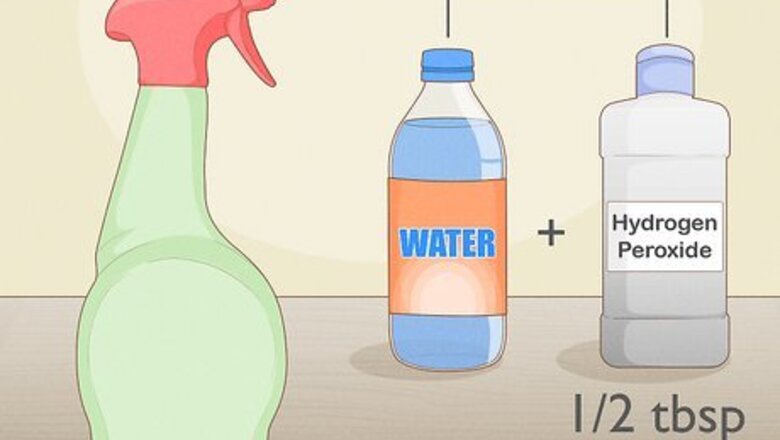
views
Germinating Rainbow Eucalyptus Seeds
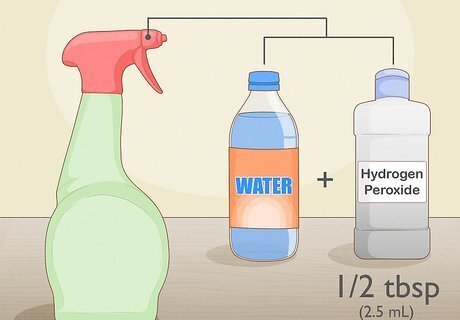
Fill a water bottle and add ⁄2 teaspoon (2.5 mL) of hydrogen peroxide. Take a standard 16 fluid ounces (470 mL) water bottle and fill it with room temperature tap water until it’s nearly full. Add in a small amount of hydrogen peroxide, seal the cap closed, and shake the bottle gently to combine the mixture. Hydrogen peroxide helps break down the seed coating, helping it germinate quicker and more easily. Make sure the water is room temperature. If it’s too hot or too cold, the seeds may not germinate.
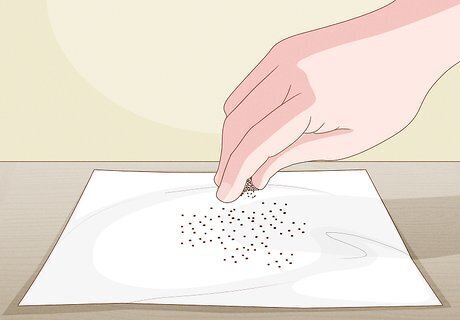
Sprinkle your rainbow eucalyptus seeds over a dry paper towel. Place a clean, dry paper towel on a flat surface you don’t mind getting wet such as a countertop or cutting board. Rainbow eucalyptus seeds are very tiny and will blow away easily, so carefully add them to the paper towel so they’re easier to see and contain. Use your fingers to gently separate them so they’re slightly spaced out. Try not to clump or pile them together or they won’t germinate as easily.
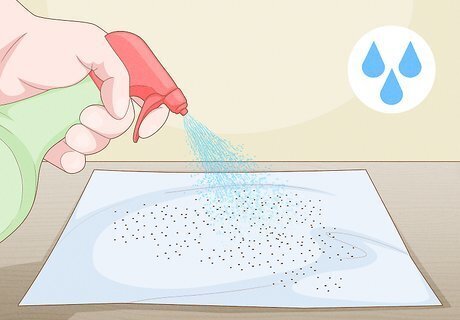
Spritz the seeds with the solution until the paper towel is damp. Take your water bottle, remove the cap, and slowly pour the solution over the paper towel. Add just enough of the water to saturate the paper towel, taking care not to wash away the delicate little seeds. Try adding water to parts of the paper towel that don’t have seeds on it, such as an edge or corner so it soaks up the water without moving the seeds.
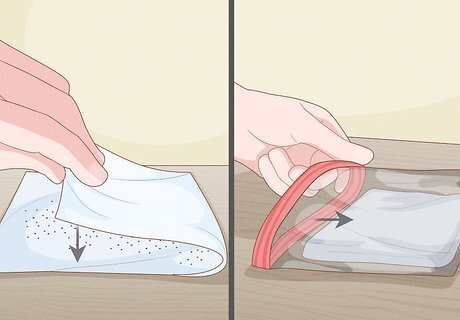
Fold the paper towel and place it in a plastic bag. Take 1 end of the paper towel and carefully bring it to the other side to fold the paper towel in half to form a rectangle. Then, take 1 of the shorter sides of the rectangle and bring it to the other side to fold the paper towel in half again so the seeds are nestled inside and won’t fall out. Then, place the damp paper towel into a sealable plastic bag and seal it. Use a sealable plastic bag to help contain the moisture.Tip: Write the date on the plastic bag so you know exactly when you put the seeds in there.
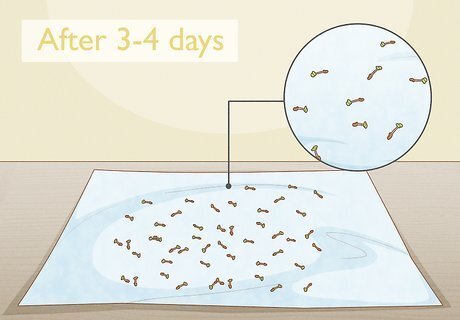
Check the seeds after 3-4 days to see if they’ve sprouted. The seeds won’t take too long to break out of their shells and start sprouting, so open up the bag and gently unfold the paper towel after about 3 days. If you see small, green sprouts, then the seeds have germinated and are ready to be planted into containers!
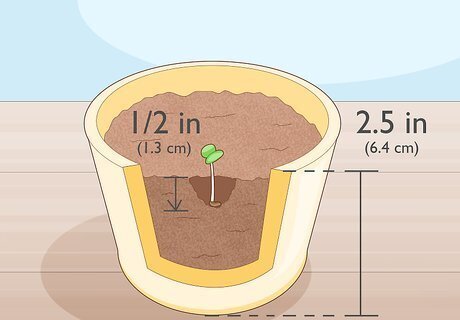
Plant the seedlings into 2.5–3.5 in (6.4–8.9 cm) containers filled with soil. The seedlings are very fragile and sensitive, so use small containers filled with a basic potting soil to help ease their transition. Fill the containers with soil and use your fingertip to make small holes about ⁄2 in (1.3 cm) deep, and drop a seedling into each one. Gently cover up the holes with the soil after you add a seedling. For the sprouts, any standard potting mix will work just fine to help them grow into seedlings and establish their root systems.
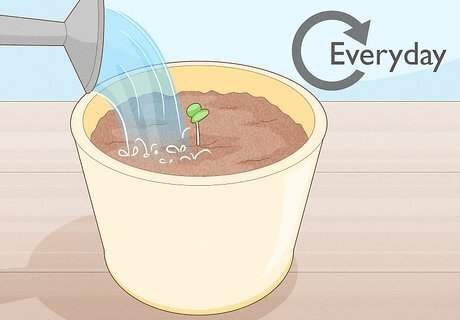
Water the seedlings every other day to keep the soil moist. The delicate seedlings need enough water to keep their roots damp, so water them immediately after you plant them in the containers. As they grow, water them at least every other day so the soil in the container is always slightly damp.
Transplanting Your Trees
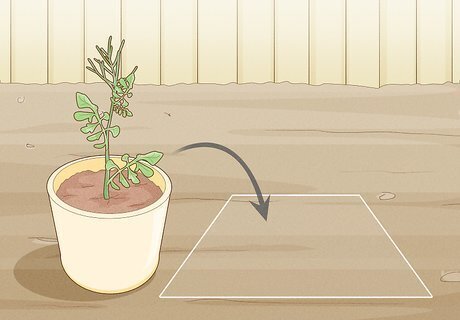
Plant trees or seedlings taller than 4 inches (10 cm) into the ground. Rainbow eucalyptus seeds and cuttings will struggle to establish root systems, but once a seedling or tree is large enough, it needs to be planted in the ground so its root system won’t form into a tight ball and struggle to grow. Once your seedlings are tall enough, it’s time to move them outside so they can stretch out their legs and start growing tall. If you’re purchasing rainbow eucalyptus from a grower or nursery, make sure they’re at least 4 inches (10 cm) tall. in a single growing season!}}Did you know? Rainbow eucalyptus trees can grow 3–5 feet (0.91–1.52 m) in a single growing season!
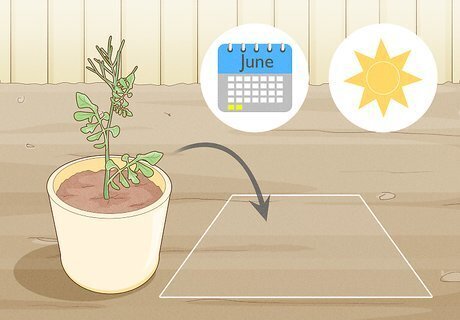
Wait until mid-summer to transplant into the ground. Transplant your rainbow eucalyptus at the beginning of their growing season so they’re better able to adjust to the shock of being planted and establish their root systems more quickly. In regions with temperate climates, around the end of June is a great time to transplant your trees so they’ll get plenty of sunlight, warmth, and water. You can plant the eucalyptus trees as late as the end of August if you live in a location that doesn’t have harsh winter freezes.
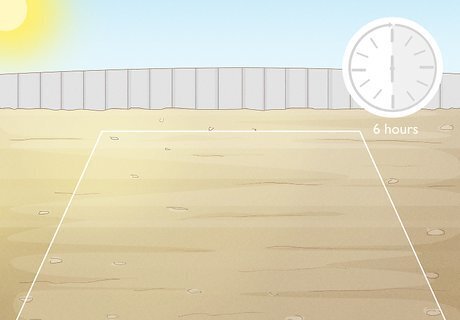
Choose a location that gets at least 6 hours of direct sunlight each day. Rainbow eucalyptus trees thrive in full sun, so look for a location that gets enough direct sunlight every day. Mark the location with a shovel and space the trees out 6 feet (1.8 m) apart if you plan to plant more than 1. Don’t choose a location beneath a structure so the trees won’t grow through them!
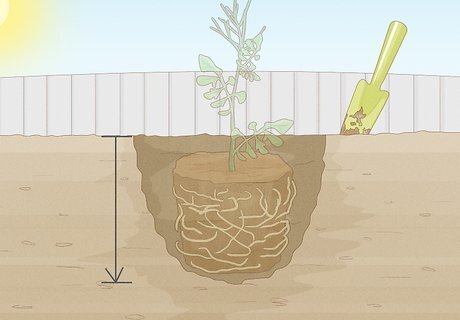
Dig a hole large enough to fit your container with a shovel. To transplant the trees, the hole you dig needs to be big enough to fit the root ball, or the tangle of roots in the containers. Use a shovel to dig down into the soil and make the hole wide and deep enough to fit your container so the top of the hole is even with the top of your container. Place the container into the hole to check to see if it’s deep and wide enough to fit it.
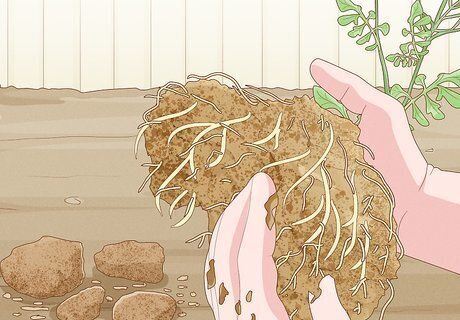
Break up the bottom section of the roots with your fingers to promote growth. Slide the roots of the plant out of the container with the dirt still attached to them. Use your fingers to separate the roots at the very bottom of the tangle so they hang loosely and will be better able to penetrate the soil when you transplant them. Be careful not to break or damage the roots when you separate them.
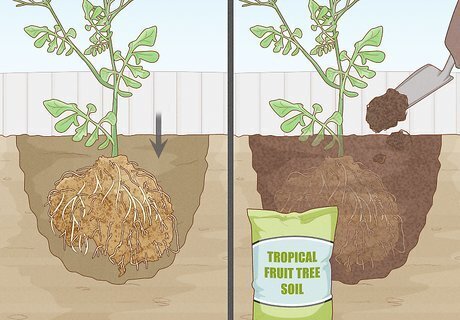
Place the plant into the hole and cover the roots with tropical fruit tree soil. Carefully set the root ball into the bottom of the hole that you dug. Fill the space between the plant and the sides of the hole with soil that’s specially designed for tropical fruit trees, which will make sure your rainbow eucalyptus gets all of the nutrients it needs to establish its roots in the ground. Pack the soil down by patting it with your hands so the tree is firmly and securely planted into the ground. Tropical fruit tree soil is full of microbes and micronutrients that will help your rainbow eucalyptus thrive. Look for tropical fruit tree soil at your local home improvement store or by ordering some online.
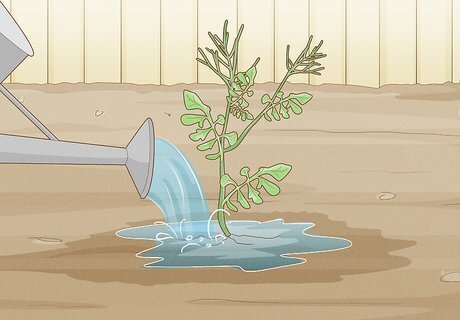
Water the transplants until you can see water at the base of the tree. Use a garden hose to water the plants until the holes are filled with water. Continue saturating the ground until you’re able to see water at the base of the tree. The amount that you need to water the transplants will vary depending on how big of a hole you dug and how damp the soil is.
Taking Care of Rainbow Eucalyptus Trees
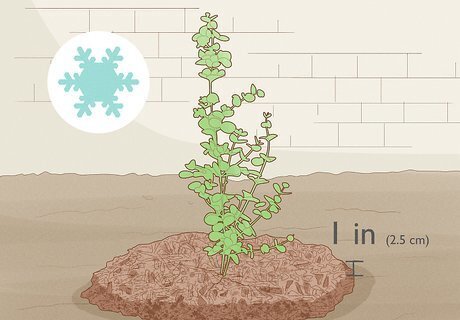
Spread a 1 in (2.5 cm) layer of organic mulch if there’s a risk of frost. If you live in a location that has hard winter freezes, use an organic mulch such as pine or cedar mulch to insulate the root system of your rainbow eucalyptus. Spread an even layer around the trunk and base of the tree to keep it protected. Rainbow eucalyptus trees are very sensitive to frost and may die in as little as 24 hours after a hard freeze. If you don’t live in a location that experiences hard freezes, you don’t need to mulch your rainbow eucalyptus trees.
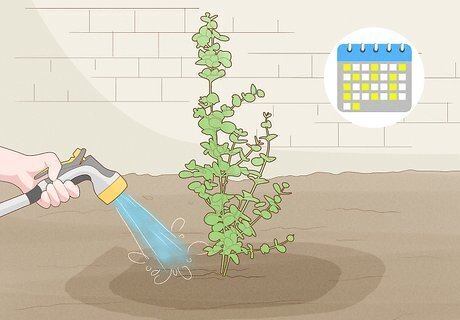
Water the plants often enough to keep the soil moist at all times. Rainbow eucalyptus trees are highly susceptible to drought, so it’s important that the soil around their roots is always damp. Water the trees 2-3 times a week to keep the soil moist so your trees can thrive. Check to see if the soil is moist by scraping it with your finger. If it’s slightly damp, you don’t need to add any more water.Tip: Use an automatic sprinkler system to keep your trees hydrated without having to water them yourself.
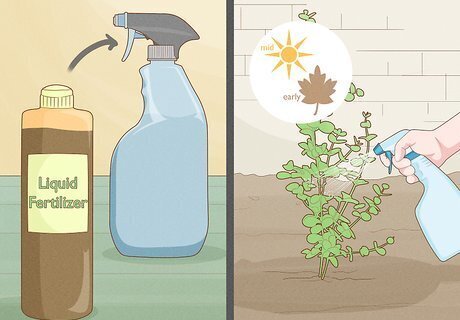
Mix liquid fertilizer with your water during the growing season. To give your trees an even greater boost, mix equal parts liquid fertilizer with your water during mid-summer through early fall, when they’re actively growing. Follow the directions on the packaging of the fertilizer and use it every time you water your trees. In temperate climates, mid-summer through early fall runs from the end of June to the end of August. Your trees will grow dramatically during the growing seasons, and within 3-5 years after transplanting them into the ground, they’ll start displaying their famous colors on their trunks!




















Comments
0 comment